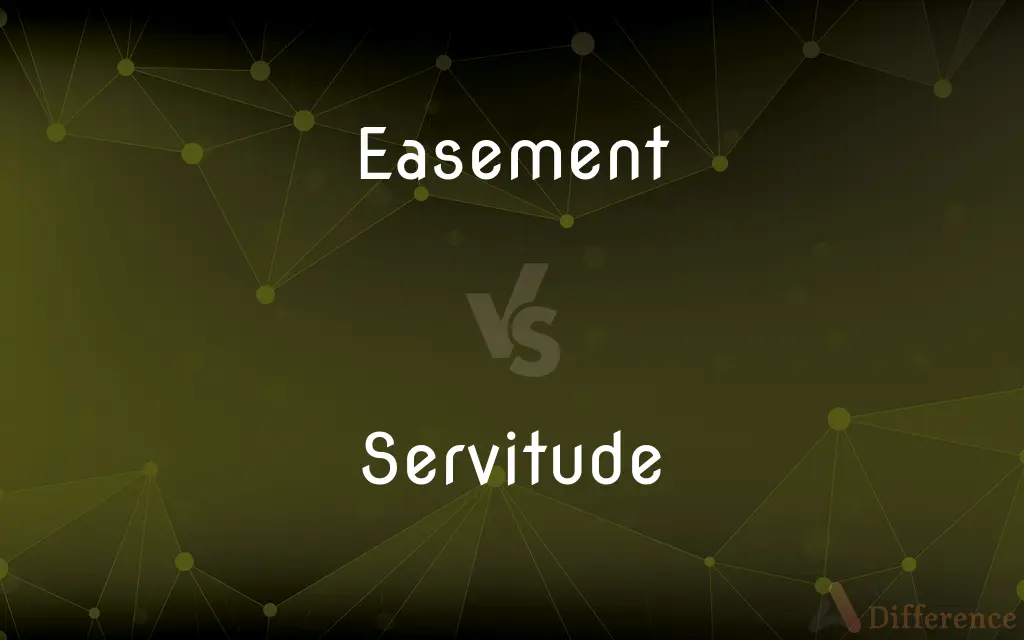Easement vs. Servitude — What's the Difference?
By Tayyaba Rehman & Urooj Arif — Updated on April 8, 2024
An easement is a legal right to use another's land for a specific purpose, while servitude refers more broadly to a legal obligation to allow or perform certain actions on someone else's property.

Difference Between Easement and Servitude
Table of Contents
ADVERTISEMENT
Key Differences
An easement is a non-possessory interest in another's property, allowing the holder to use the property for a specific purpose, such as access to a road or utility lines. On the other hand, servitude is a broader term that encompasses various forms of burdens on property, including easements, but also other rights such as profit à prendre (the right to take something from someone else's land, like minerals or timber).
Easements are often granted for utility companies to install and maintain lines, or for individuals to gain access to their property. Servitudes can include these uses but may also involve more complex arrangements, like maintaining a wall or fence on someone else's property.
The creation of an easement typically requires a written agreement that specifies the rights granted and is recorded with local land records. Conversely, servitudes can be established not only by agreement but also by necessity, prescription (long-term use), or implication (necessary for the use of land).
Easements are generally divided into two main types: appurtenant, which benefits a particular piece of land and transfers with the land, and in gross, which benefits an individual or entity and does not necessarily transfer with the land. Servitudes, while including easements, can also embody personal obligations that do not attach to the land but bind specific parties.
Disputes involving easements often center on the scope of the easement or interference with the easement holder's rights. Servitude disputes may be broader, dealing not only with rights of use but also with obligations to perform actions or refrain from certain activities on the burdened land.
ADVERTISEMENT
Comparison Chart
Definition
A right to use another's land for a specific, limited purpose.
A broad term for a legal obligation to allow or perform actions on another's property.
Types
Appurtenant (benefits land) and in gross (benefits an individual).
Includes easements, profits à prendre, and personal obligations.
Creation
Typically requires a written agreement and recording.
Can be created by agreement, necessity, prescription, or implication.
Purpose
Often for access to property or utility lines.
Can include access, but also obligations like maintenance or restrictions.
Dispute Focus
Scope of use, interference.
Obligations to perform or refrain from actions, in addition to scope of use.
Compare with Definitions
Easement
Provides access or utility services.
An easement allowed the neighbor to use the driveway for access.
Servitude
Includes easements and other rights.
A servitude might allow a neighbor to pick fruit from a tree on your land.
Easement
On the rights to use, not ownership.
The easement gave no ownership rights, only access.
Servitude
Can arise by agreement or law, like necessity.
A servitude for drainage was established by necessity due to the land's topography.
Easement
Formal agreement, usually recorded.
The easement was documented and added to the property’s legal records.
Servitude
Can be personal or relate to land use.
The personal servitude ended when the holder passed away.
Easement
Appurtenant to the land or in gross to a person.
The easement appurtenant transferred with the property sale.
Servitude
Encompasses obligations and rights.
The servitude imposed both the right to access and the obligation to maintain the path.
Easement
A legal right to use another's property for a specific purpose.
The homeowner granted an easement for a water line across his land.
Servitude
A broad legal obligation on property, allowing specific uses or actions.
The servitude required the homeowner to maintain a shared wall.
Easement
An easement is a nonpossessory right to use and/or enter onto the real property of another without possessing it. It is "best typified in the right of way which one landowner, A, may enjoy over the land of another, B".
Servitude
A state of subjection to an owner or master.
Easement
The act of easing or the condition of being eased.
Servitude
Lack of personal freedom, as to act as one chooses.
Easement
Something that affords ease or comfort.
Servitude
Forced labor imposed as a punishment for crime
Penal servitude in labor camps.
Easement
(Law) A right to make limited use of another's land, such as a right of way.
Servitude
(Law) An easement.
Easement
(law) An interest in land which grants the legal right to use another person's real property (real estate), generally in order to cross a part of the property or to gain access to something on the property (right of way).
The power company has an easement to put their electricity poles along the edge of this land.
Servitude
The state of being a slave; slavery; being forced to work for others or do their bidding without one's consent or against one's will, either in perpetuity or for a period of time over which one has little or no control.
Easement
(architecture) An element such as a baseboard, handrail, etc., that is curved instead of abruptly changing direction.
Servitude
(legal) A qualified beneficial interest severed or fragmented from the ownership of an inferior property and attached to a superior property or to some person other than the owner; the most common form is an easement.
Easement
(archaic) Easing; relief; assistance; support.
Servitude
(dated) Service rendered in the army or navy.
Easement
The act of relieving oneself: defecating or urinating.
Servitude
(obsolete) Servants collectively.
Easement
(model railroading) Transition spiral curve track between a straight or tangent track and a circular curved track of a certain radius or selected radius.
Servitude
(archaic) The act of serving (food or drink, etc.); service.
Easement
Gratification. en
Servitude
The state of voluntary or compulsory subjection to a master; the condition of being bound to service; the condition of a slave; slavery; bondage; hence, a state of slavish dependence.
You would have sold your king to slaughter,His princes and his peers to servitude.
A splendid servitude; . . . for he that rises up early, and goes to bed late, only to receive addresses, is really as much abridged in his freedom as he that waits to present one.
Easement
That which gives ease, relief, or assistance; convenience; accommodation.
In need of every kind of relief and easement.
Servitude
Servants, collectively.
After him a cumbrous trainOf herds and flocks, and numerous servitude.
Easement
A liberty, privilege, or advantage, which one proprietor has in the estate of another proprietor, distinct from the ownership of the soil, as a way, water course, etc. It is a species of what the civil law calls servitude.
Servitude
A right whereby one thing is subject to another thing or person for use or convenience, contrary to the common right.
Easement
A curved member instead of an abrupt change of direction, as in a baseboard, hand rail, etc.
Servitude
State of subjection to an owner or master or forced labor imposed as punishment;
Penal servitude
Easement
(law) the privilege of using something that is not your own (as using another's land as a right of way to your own land)
Easement
The act of reducing something unpleasant (as pain or annoyance);
He asked the nurse for relief from the constant pain
Common Curiosities
How does a servitude differ from an easement?
Servitude is a broader concept that includes easements and other obligations on property.
What is an easement?
A right to use another's land for a specific purpose.
Can an easement be transferred?
Yes, appurtenant easements transfer with the land, while easements in gross may not.
What are common purposes for granting an easement?
Access to property, utility lines, and conservation are common purposes.
Can servitudes impose obligations?
Yes, they can obligate actions or restrict activities on the burdened property.
How are disputes over easements resolved?
Through negotiation, mediation, or litigation focusing on the scope and interference.
Can a servitude affect property value?
Yes, depending on its nature, it can either increase or decrease property value.
Are easements visible on property deeds?
Yes, they are usually recorded in the property's legal description.
How does one terminate an easement?
Through agreement, abandonment, or fulfilling the purpose for which it was established.
How is a servitude created?
Through agreement, necessity, prescription, or implication.
What happens to a servitude when property is sold?
It depends on the servitude type; some may transfer with the property, while personal servitudes might not.
Is a written agreement required for an easement?
Typically, yes, to specify the terms and record with land records.
What is a profit à prendre?
A type of servitude allowing one to take something from another’s land.
Can public utilities establish easements without owner consent?
Yes, through a process called condemnation or eminent domain, for public benefit.
What legal protections exist for easement holders?
Easement holders are protected against interference and can enforce their rights legally.
Share Your Discovery

Previous Comparison
Colonnade vs. Peristyle
Next Comparison
Meister vs. MasterAuthor Spotlight
Written by
Tayyaba RehmanTayyaba Rehman is a distinguished writer, currently serving as a primary contributor to askdifference.com. As a researcher in semantics and etymology, Tayyaba's passion for the complexity of languages and their distinctions has found a perfect home on the platform. Tayyaba delves into the intricacies of language, distinguishing between commonly confused words and phrases, thereby providing clarity for readers worldwide.
Co-written by
Urooj ArifUrooj is a skilled content writer at Ask Difference, known for her exceptional ability to simplify complex topics into engaging and informative content. With a passion for research and a flair for clear, concise writing, she consistently delivers articles that resonate with our diverse audience.














































